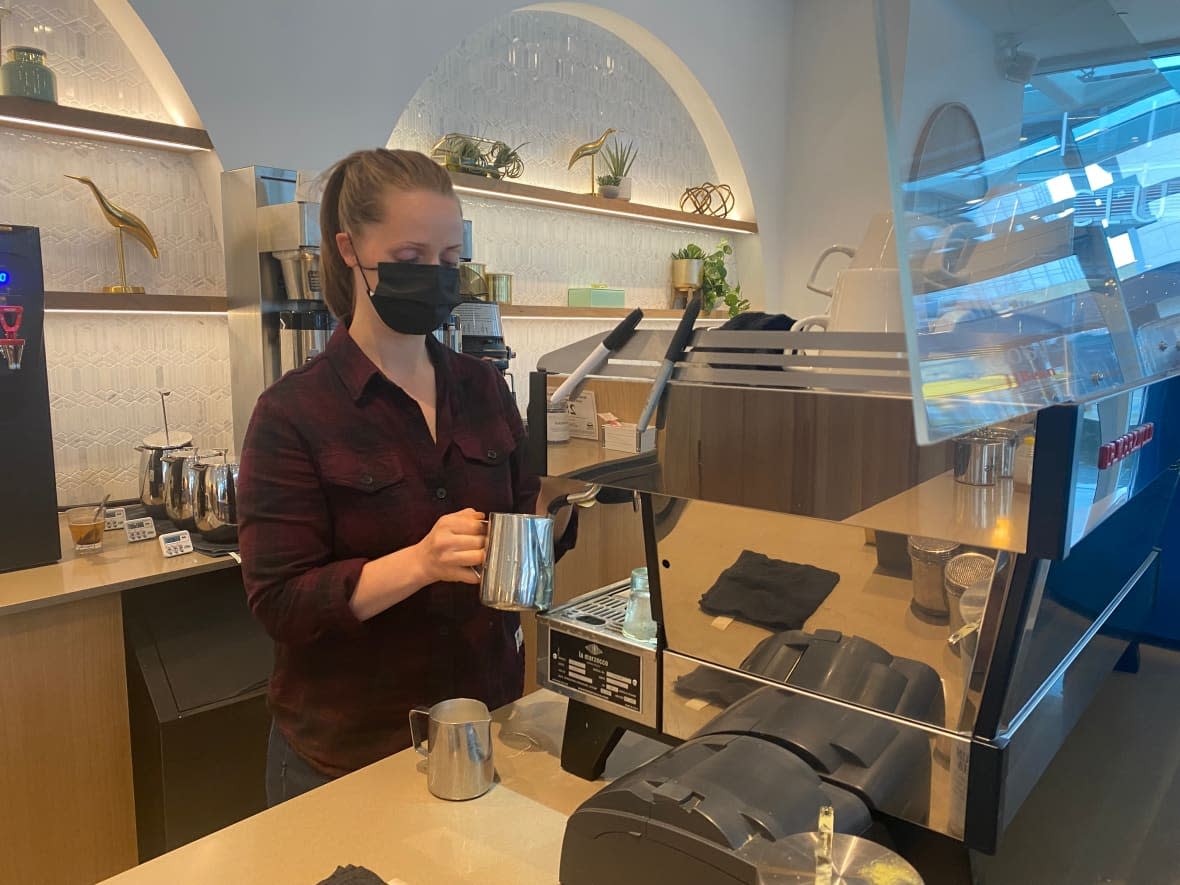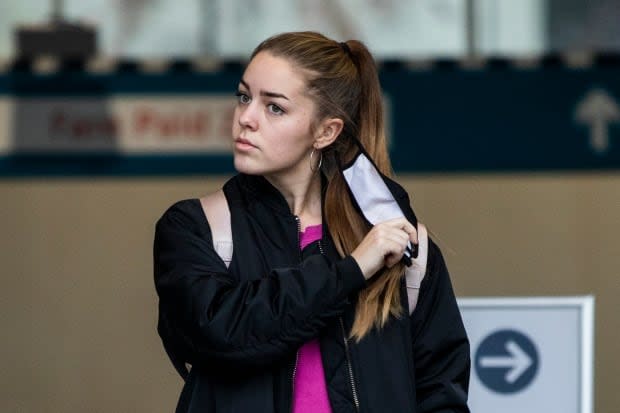Some B.C. businesses embrace mask mandates lifting, while others keep requirements in place

British Columbians no longer have to wear masks in low-risk, indoor public spaces as of Friday, news which which had some people celebrating — and others feeling uncertain about their safety.
During a news conference on Thursday, Provincial Health Officer Dr. Bonnie Henry said some people will continue to wear masks, and some businesses may choose to ask patrons to wear them, but they are no longer required under an order.
"We need to support that. We need to recognize that we all have our own risks and our own vulnerabilities," Henry said.
Masks will be encouraged in spaces where physical distancing is difficult to maintain, such as on public transit and on B.C. Ferries, but they will not be required.
TransLink has issued a news release saying it will no longer require masks to be worn and is working to remove signs indicating otherwise. Customers and employees using HandyDART services, however, will still be required to wear masks.
WATCH | Dr. Bonnie Henry on changes to the mask requirement
The University of British Columbia released a statement saying masks will still be required in public indoor spaces on both campuses, until April 30.
People must also continue to wear masks in spaces that are federally regulated such as airports.
Canada's Chief Public Health Officer Dr. Theresa Tam said Friday that federal agencies overseeing masking mandates in Canada for activities like domestic travel are evaluating the situation and could make "policy adjustments as needed in the coming days and weeks."
Masks will also still be required in health-care settings, such as physician's offices. Workplaces may still require masks to be worn, but it is no longer a requirement of workplace safety plans.
Mixed feelings on mandates lifting
Patricia Massy, owner of Massy Books in Vancouver, is one business owner who says she will keep a mask policy in place for now.
"It's really important that staff wear masks to protect one another and the people in our lives, as well as our customers," she said.
Daniela O'Fee, a piano teacher in Kamloops, said she will still be wearing her mask.
"A lot of my students also live with grandparents or vulnerable people in their family and due to the fact that I don't have a lot of open windows in my studio and it's a smaller space and we're quite close, we've all worked as a team to try to keep everybody safe," she said.
Other businesses, however, welcomed the news.
Angela Williams, who manages a JJ Bean coffee shop in Burnaby, said while she understands some people are nervous about mandates lifting, she will find it less stressful no longer having to enforce masking rules.
"It's nice to not have to police the public anymore," she said.
WATCH | Some businesses continue to require masks
But Williams said she, personally, will continue to wear a mask "in solidarity" with staff and customers who are doing the same.
"I don't want anyone to feel isolated," she said.
Arena restrictions lifting
The Vancouver Canucks announced Friday it would be lifting its mask mandate for both the Rogers Arena and Abbotsford Centre, while several smaller venues followed suit.
In Prince George, CN Centre manager Glenn Mikkelsen said it was a "relief" to know the province feels it is safe to proceed with large-scale events, such as the upcoming World Women's Curling Tournament which the city is hosting later this month after having the event cancelled due to COVID in 2020.
"I cannot really express to you how thrilling it will be to finally get this event underway," he said.

Fears for immunocompromised
Eileen Davidson, an immunocompromised advocate for people with rheumatoid arthritis, said the lifting of masks mandates has her fearful for herself and other people at higher risk of severe outcomes if they are exposed to COVID-19.
"I have as much pandemic fatigue as the next person but I also am immunocompromised and I'm aware that if I do get an infection, it could have quite negative consequences for me, not necessarily will land me in the hospital, but I would also be dealing with the infection on top of a rheumatoid arthritis flare," she said.
According to Statistics Canada data in 2020, around 14 per cent of Canadians aged 15 years or older have a compromised immune system that increases their risk of adverse outcomes from COVID-19.
WATCH | Mixed reactions to mask mandates lifting
Around 38 per cent of Canadian adults living in private households reported having one or more underlying health conditions that could put them at elevated risk of complications following COVID-19 infection, StatsCan found.
Dawn Bowdish, Canada Research Chair in aging and immunity and assistant professor at McMaster University said while vaccination helps ease the risk, it does not completely eliminate it.
"Three doses does reduce the risk of becoming infected with Omicron in the healthy public but you can still carry it and spread to an immunocompromised person."
Visitations and vaccine cards
Other provincial changes include the restoration of long-term care visitation, and facilities are expected to have their new rules in place by March 18, Henry said.
Faith gathering capacity limits will be lifted, effective 12:01 a.m. March 11.
The provincial mandate for vaccine cards — which were required in non-essential indoor spaces like restaurants and gyms — will be dropped on April 8, as long as conditions continue to improve.
"We are going to take a balanced transition approach over the next few weeks," Henry said.
On April 8, businesses can shift from their COVID-19 safety plans to communicable disease plans. Federally regulated workplaces must continue to follow federal guidelines.
The vaccination requirement for those living in post-secondary residences will also be lifted next month.
Guidelines for schools and child-care settings will be revised and updated. Masks will no longer be required in all settings in schools after spring break.
Transmission, hospitalizations down
Henry said that while the risk of contracting and transmitting COVID-19 is not zero, she's confident these changes can be made safely.
Decreased transmission, fewer hospitalizations and high rates of vaccinations have all been reported over the past few weeks.

As of Thursday, there were 388 people in hospital with COVID-19, down more than 50 per cent compared to a month ago.
The province says 90.7 per cent of British Columbians aged five and up have received a first dose of COVID-19 vaccine and 86.6 per cent, a second dose. B.C. has one of the highest rates of vaccination in the world, officials say.
Health officials say population immunity in B.C. is high, with more than 90 per cent of the population believed to have either been vaccinated or likely infected.
Officials are reminding residents to continue to manage their own health by monitoring for symptoms, staying home when sick and continuing hand hygiene.
Henry also strongly encourages anyone who hasn't yet been vaccinated to do so.
"We need to be ready and prepared for what the virus may bring next."
Focus on surveillance
COVID-19 will be with us for years to come, Henry said, which means officials will need to monitor the situation over time.
Virus mutations, transmission and impact on the health-care system are all things Henry and the B.C. Centre for Disease Control will be watching in months to come through lab-based genetic sequencing, wastewater testing and facility-based monitoring.
"We're not yet in that endemic state where we know what to expect," Henry said.


